[ESP/ENG] Juegos Olímpicos Tokyo 2020, el mayor evento multidisciplinario deportivo a nivel mundial ha comenzado. / Tokyo 2020 Olympic Games, the world's largest multidisciplinary sporting event has begun.
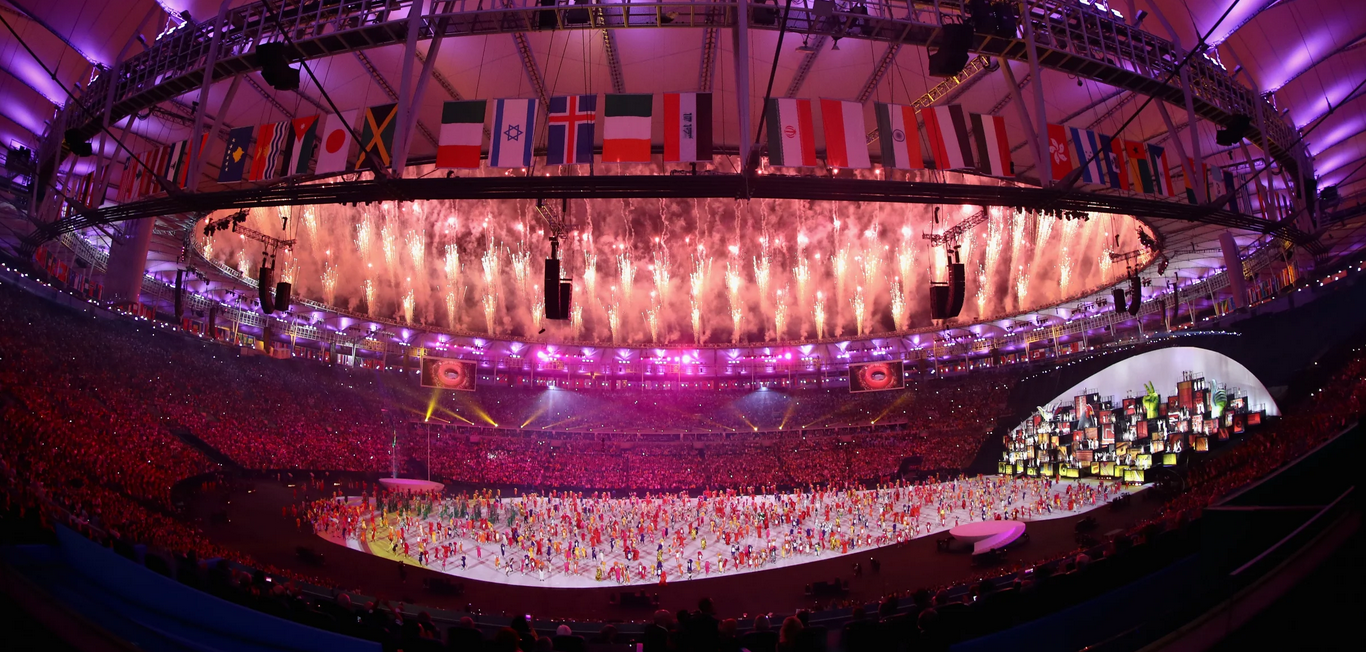
Los Juegos Olímpicos han llegado. Después de incertezas, dudas, posibles postergaciones y cambios de sedes, aún no respetando el cronograma original en cuanto a tiempos se refiere, debido a los tremendos efectos a nivel mundial del coronavirus, Tokyo 2020 es una realidad. Aunque se realice en el 2021.
Los tiempos cambian pero la esencia del deporte queda. Y los Juegos Olímpicos representan eso: la esencia pura del deporte, aunque éste en términos generales esté ya totalmente profesionalizado.
Tal vez la diferencia entre los primeros juegos ideados por el barón Pierre de Coubertin -quien además fue el creador de la disciplina llamada pentatlón- y los actuales sea ésa precisamente: el traspaso del amauterismo a la profesionalidad.

The Olympic Games have arrived. After uncertainties, doubts, possible postponements and changes of venues, still not respecting the original schedule in terms of timing, due to the tremendous worldwide effects of the coronavirus, Tokyo 2020 is a reality. Even if it takes place in 2021.
Times change but the essence of sport remains. And the Olympic Games represent just that: the pure essence of sport, even if it is by and large now fully professionalized.
Perhaps the difference between the first games devised by Baron Pierre de Coubertin -who was also the creator of the discipline called pentathlon- and the current ones is precisely that: the transfer from amateurism to professionalism.
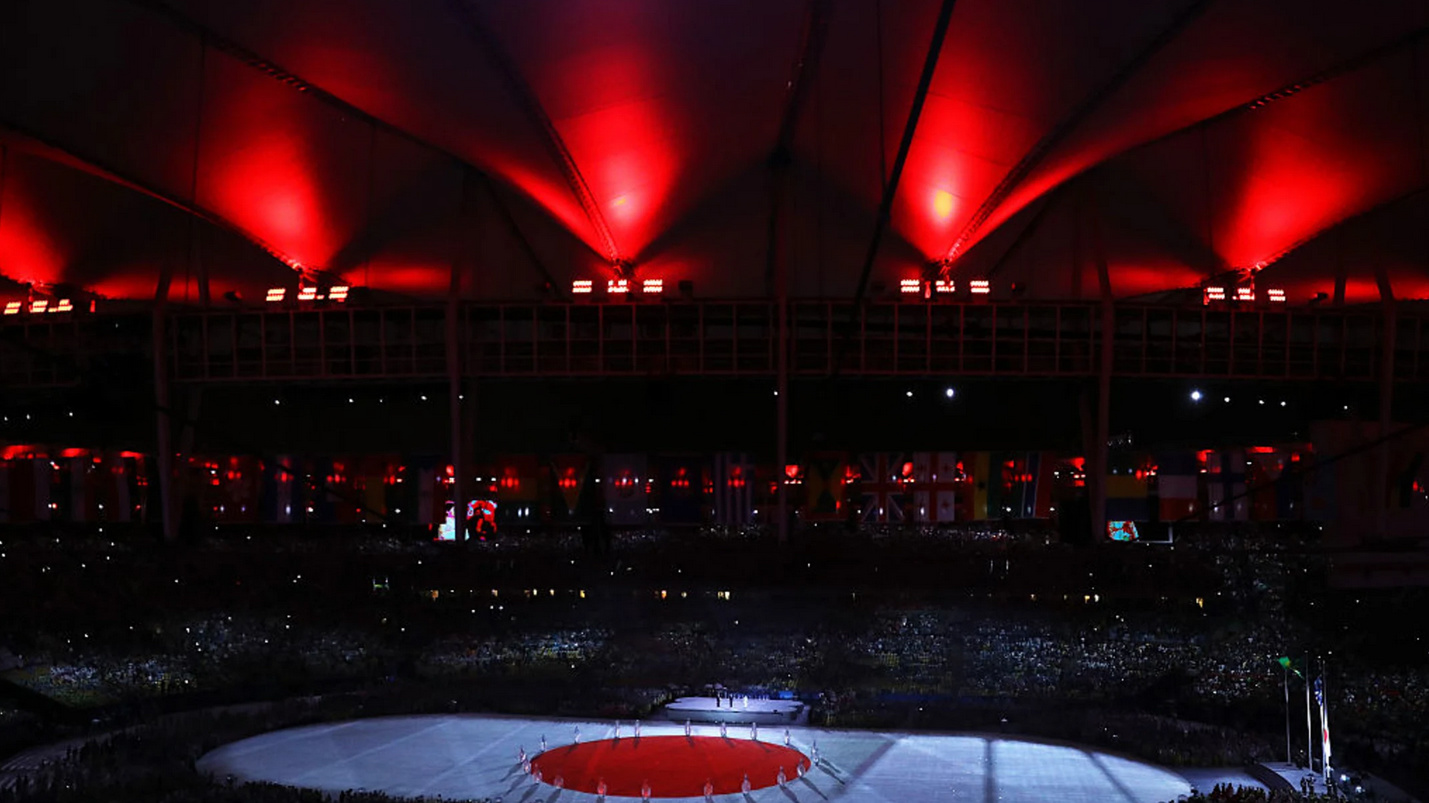
El origen de los Juegos Olímpicos y su evolución. / The origin of the Olympic Games and their evolution.
Los Juegos tienen casi tres milenios de antigüedad. Se celebraron en la Antigua Grecia en la ciudad de Olimpia (actualmente sitio arquelógico en la periferia de Elide -Grecia-) en el período delimitado entre los años 776 a.C. y el año 393 de nuestra actual era. Es decir durante un milenio. Se llamaron Juegos Olímpicos de la Antigüedad y pasaron varios siglos antes de fueran organizados de nuevo.
A fines del siglo XVIII surge la idea de organizar los Juegos Olímpicos con una idea más moderna, con reglas definidas para cada deporte y estableciendo específicamente que deportes podían ser considerados olímpicos y cuales no.
Se instituye el COI (Comité Olímpico Internacional) gracias a las gestiones del barón Pierre de Coubertin y se define la llamada Carta Olímpica que establece su estructura y su autoridad.
De esta manera los primeros Juegos Olímpicos de la Edad Moderna se celebran en el mismo lugar en que tuvieron origen: Atenas en el año 1894 basados en el amateurismo.
A partir de ese momento se han realizado en forma ininterrumpida cada cuatro años salvo el parétesis impuesto por las guerras mundiales (no se celebró en 1916 en medio de la Primera Guerra Mundial 1914-1918 y tampoco se llevó a cabo las ediciones de 1940 y 1944 en plena Segunda Guerra Mundial 1938-1945).

The Games are almost three millennia old. They were held in Ancient Greece in the city of Olympia (now an archaeological site on the outskirts of Elide, Greece) in the period between 776 B.C. and 393 of our present era. That is to say during a millennium. They were called the Olympic Games of Antiquity and it took several centuries before they were organized again.
At the end of the 18th century, the idea of organizing the Olympic Games with a more modern idea arose, with defined rules for each sport and establishing specifically which sports could be considered Olympic and which could not.
The IOC (International Olympic Committee) was instituted thanks to the efforts of Baron Pierre de Coubertin and the so-called Olympic Charter was defined, establishing its structure and authority.
Thus, the first Olympic Games of the Modern Age were held in the same place where they originated: Athens in 1894, based on amateurism.
From that moment on, they have been held uninterruptedly every four years except for the parenthesis imposed by the world wars (they were not held in 1916 in the middle of the First World War 1914-1918 and the 1940 and 1944 editions were not held in the middle of the Second World War 1938-1945).
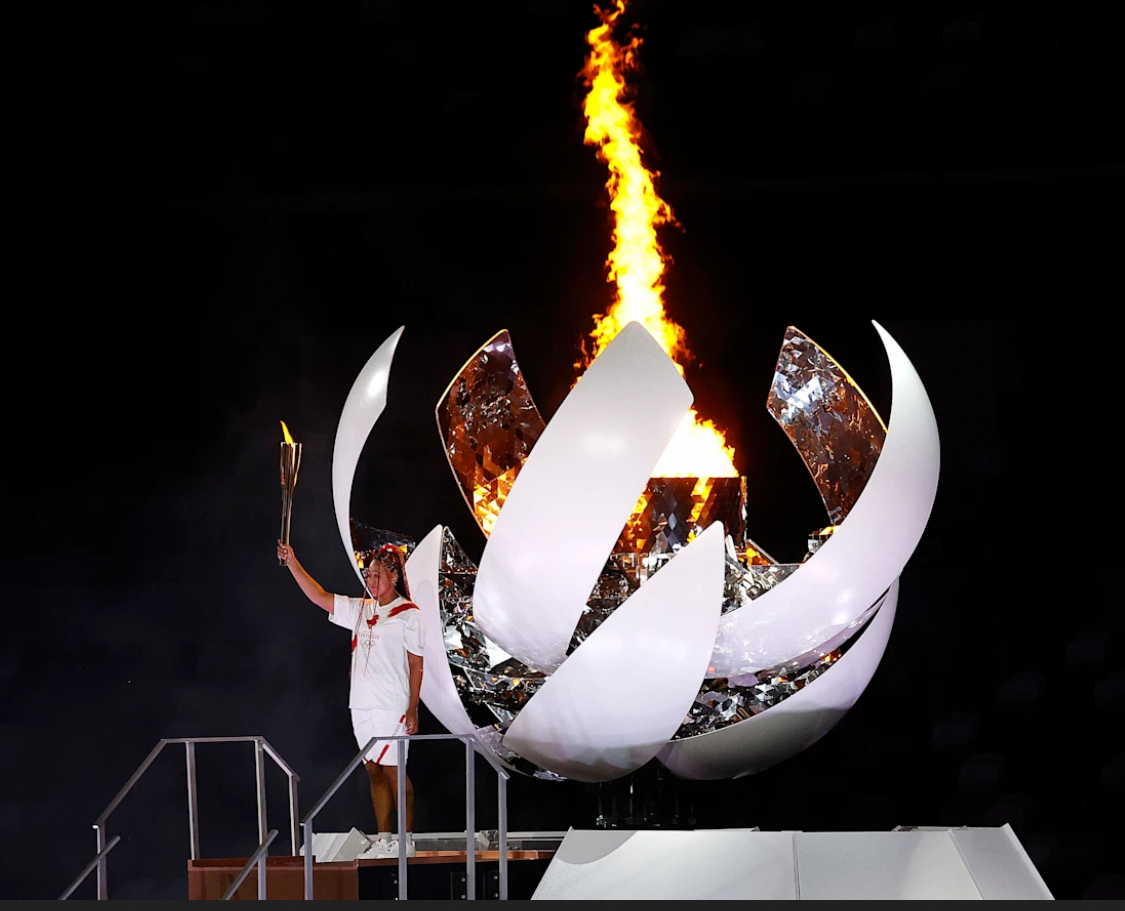
La actualidad de los Juegos Olímpicos. / The actuality of the Olympic Games.
Es un hecho que los Juegos Olímpicos han debido alejarse del concepto de amauteurismo puro. Por no decir que lo han abandonado totalmente. El amateurismo a nivel competitivo ya no existe.
Los tremendos avances tecnológicos, económicos, políticos, sociales en las últimas décadas han llevado al COI a tener que adaptarse a las nuevas reglas. Esponsorizaciones, récords, nuevos deportes, nuevas disciplinas en deportes ya existentes, el interés despertado por el deporte en general en los medios masivos de comunicación especialmente la televisión, llevaron al COI a tener que aceptar la participación en los Juegos de deportistas profesionales. Y a modificar sustancialmente la Carta Olímpica.
Otra novedad en los Juegos Olímpicos modernos es la división de los Juegos en dos categoría: Juegos Olímpicos de Invierno agregados después de la primera guerra mundial (incorporando a los juegos aquellos deportes practicados en la nieve o el hielo) y los clásicos Juegos Olímpicos de Verano. Se agregaron también en el año 1960 los Juegos Paralímpicos para personas con algún tipo de incapacidad como amputaciones, ceguera, parálisis cerebral o discapacidades intelectuales por citarlas en forma general.

It is a fact that the Olympic Games have had to move away from the concept of pure amateurism. Not to say that they have abandoned it completely. Amateurism at the competitive level no longer exists.
The tremendous technological, economic, political and social advances in recent decades have led the IOC to have to adapt to the new rules. Sponsorships, records, new sports, new disciplines in existing sports, the interest awakened by sport in general in the mass media, especially television, led the IOC to accept the participation of professional athletes in the Games. And to substantially modify the Olympic Charter.
Another novelty in the modern Olympic Games is the division of the Games into two categories: Winter Olympic Games added after the First World War (incorporating into the Games those sports practiced on snow or ice) and the classic Summer Olympic Games. The Paralympic Games were also added in 1960 for people with some kind of disability such as amputations, blindness, cerebral palsy or intellectual disabilities, to mention them in general.
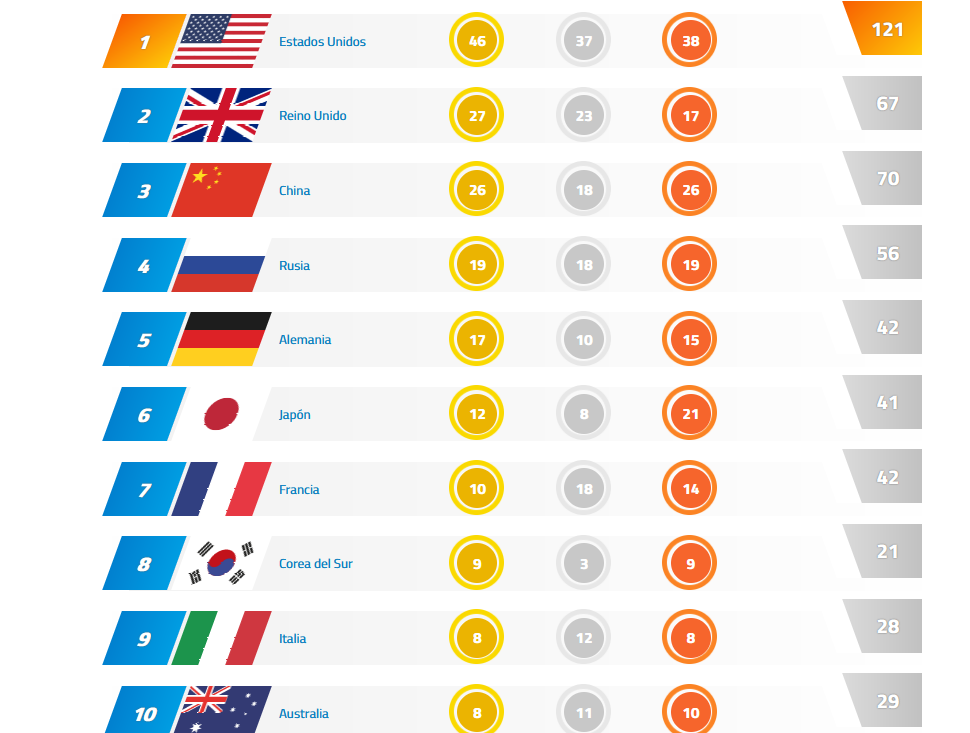
Los candidatos por países. / Candidates by country.
Es evidente que la condición de local es una ventaja que se ha manfiestado siempre en los Juegos Olímpicos.
En los últimos Juegos celebrados en Brasil el país anfitrión terminó en el puesto número 13 en el medallero general. Excelente ubicación.
China que hasta ese momento no se había demostrado una verdadera potencia arrasó en los Juegos de Pekin 2008 relegando a EE. UU. al segundo lugar y a Rusia al tercero, mientras que el Reino Unido ocupó el tercer escalón del podio en los Juegos de Londres 2012 detrás de China y EE.UU.
Fue la última aparición de Rusia en el podio. Animador tradicional de los primeros puestos se ha tenido que conformar con un cuarto puesto en los dos últimos Juegos.
Todo parecería indicar una lucha cerrada entre EE. UU. y China por la primera posición en el medallero por países mientras que seguramente Japón mejorará sensiblemente sus prestaciones de Juegos anteriores, sobre todo con las medallas que puede obtener en el Karate, incorporado en Tokyo 2020 debido a la fuerte presión de la Federación Japonesa de este deporte.
En Londres 2012 Japón ocupó el lugar número 11 en la clasificación general por países y en Rio 2016 mejoró muchísimo ocupando la sexta posición. No sería raro que peleara por el tercer lugar con el Reino Unido.

It is evident that the local condition is an advantage that has always been shown in the Olympic Games.
In the last Games held in Brazil, the host country finished 13th in the overall medal standings. Excellent placement.
China, which up to that point had not shown itself to be a true powerhouse, swept the 2008 Beijing Games, relegating the USA to second place and Russia to third, while the UK took the third step on the podium at the London 2012 Games behind China and the USA.
It was Russia's last appearance on the podium. A traditional cheerleader for the top spots, it has had to settle for fourth place at the last two Games.
Everything seems to indicate a close fight between the USA and China for the first position in the medal table by country, while Japan will surely improve significantly its performance in previous Games, especially with the medals it can obtain in Karate, incorporated in Tokyo 2020 due to the strong pressure of the Japanese Federation of this sport.
In London 2012 Japan ranked 11th in the overall ranking by country and in Rio 2016 it improved a lot, occupying the sixth position. It would not be unusual for it to fight for third place with the United Kingdom.

Los atletas candidatos. / Candidate athletes.
Aparte de estar marcados por la pandemia del coronavirus estos Juegos estarán siglados por otras características que han impedido hasta la fecha de ver, en el horizonte, a esos candidatos "casi seguros" a llevarse medallas.
La escasa participación de los atletas en torneos internacionales muchos de ellos cancelados por la pandemia, ha hecho que el nivel de participación preolímpico haya sido muy escaso.
No olvidemos la restricción total en el primer semestre/año de la pandemia. Prohibiciones incluso de circular, no solo de organizar y participar en eventos deportivos. Competencias mundiales canceladas y/o postergadas en todos los deportes.
Esto ha llevado sin lugar a dudas a que los atletas no se presenten en óptima forma en estos Juegos. Si en óptima forma física, la labor en gimnasios se ha intensificado mucho en estos últimos meses.
Pero lo que faltará en cada atleta será una importante dosis de competencia de alto nivel. Veremos hasta que punto se hará sentir en estos Juegos.
Por otro lado no se ve en el horizonte inmediato un Ian Thorpe aquel fantástico nadador australiano ganador de cinco medallas olímpicas y once medallas de oro en los Campeonatos Mundiales de Natación.
Por no citar a su similar estadounidense Michael Phelps, el nadador de Baltimore, el deportista olímpico más condecorado de todos los tiempos (28 medallas de las cuáles 23 de oro).
O Mark Spitz siguiendo con esos récords olímpicos en la natación en los eventos de 1968 y 1972 con sus 7 medallas de oro en medio del caos desatado por el secuestro y posterior liberación de los atletas hebreos por parte de un comando terrorista palestino.
O Carl Lewis en atletismo con sus 10 medallas olímpicas en velocidad y salto en largo.
En medio de todos ellos una "desconocida" Larisa Latýnina, ucraniana, 18 medallas en gimnasia artística. Casi nada.
O si queremos citar otros deportes e ir atrás en el tiempo Paavo Nurmi, el fondista finlandés, ganador de 9 medallas olímpicas, dueñ o seño indiscutidos de sus disciplinas por años con sus 22 plusmarcas munbdiales.
No hay una figura de estas envergaduras en Tokyo 2020.
Pero los Juegos Olímpicos, se sabe, siempre deparan sorpresas.

Apart from being marked by the coronavirus pandemic, these Games will be marked by other characteristics that have so far prevented to see, on the horizon, those "almost certain" candidates to win medals.
The scarce participation of athletes in international tournaments, many of them cancelled due to the pandemic, has meant that the level of pre-Olympic participation has been very low.
Let us not forget the total restriction in the first semester/year of the pandemic. Prohibitions even to circulate, not only to organize and participate in sporting events. World competitions cancelled and/or postponed in all sports.
This has undoubtedly led to athletes not showing up in top form at these Games. If in top physical shape, the work in gyms has intensified a lot in recent months.
But what will be missing in each athlete will be an important dose of high-level competition. We will see to what extent it will be felt in these Games.
On the other hand, there is no Ian Thorpe on the immediate horizon, that fantastic Australian swimmer who won five Olympic medals and eleven gold medals at the World Swimming Championships.
Not to mention his American counterpart Michael Phelps, the swimmer from Baltimore, the most decorated Olympian of all time (28 medals, 23 of them gold).
Or Mark Spitz following those Olympic records in swimming in the 1968 and 1972 events with his 7 gold medals in the midst of the chaos unleashed by the kidnapping and subsequent release of the Hebrew athletes by a Palestinian terrorist commando.
Or Carl Lewis in athletics with his 10 Olympic medals in sprint and long jump.
In the middle of all of them an "unknown" Larisa Latýnina, Ukrainian, 18 medals in artistic gymnastics. Almost nothing.
Or if we want to mention other sports and go back in time, Paavo Nurmi, the Finnish long-distance runner, winner of 9 Olympic medals, undisputed master of his disciplines for years with his 22 world records.
There is no figure of this magnitude in Tokyo 2020.
But the Olympic Games, it is known, always bring surprises.

El crédito por el separador con el logo de #Hive va a PeakStudio -modificado por el autor con el logo oficial de los Juegos Olímpicos Tokio 2020-
El crédito por el banner general con los distintos deportes va a Unsplash -modificado por el autor con el logo oficial de los Juegos Olímpicos Tokio 2020-
Credit for the #Hive logo divider goes to PeakStudio -modified by the author with the official logo of the Tokyo 2020 Olympic Games-.
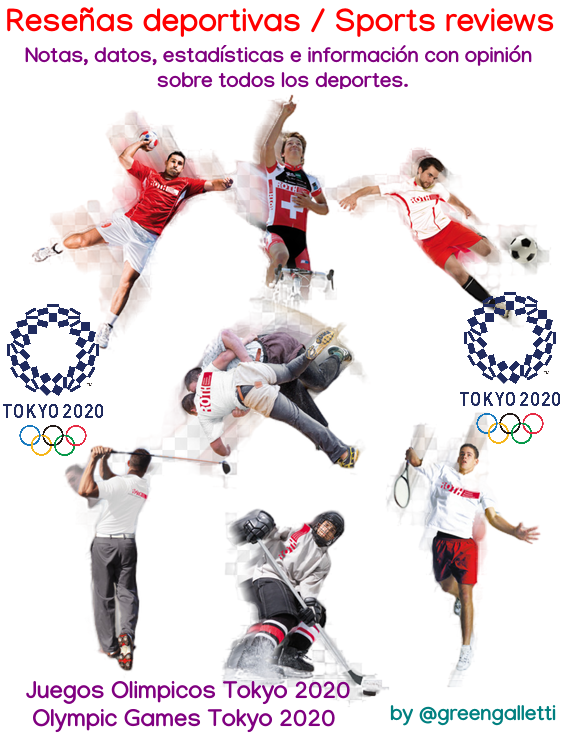











Comments